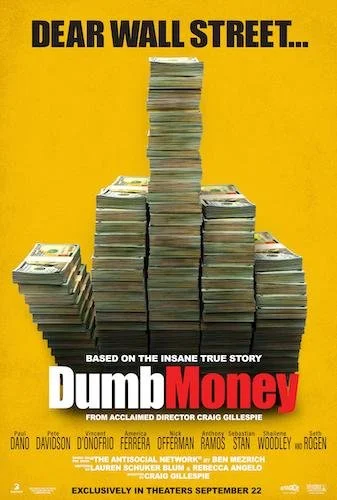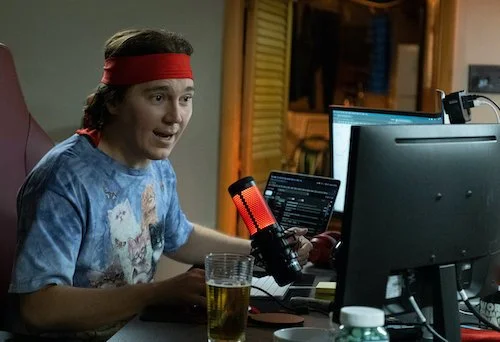Dumb Money
Written by Andreas Babiolakis
Ah, yes. The end of 2020. It feels like it was yesterday, and I wish to Christ it didn’t. The COVID-19 pandemic was still in full effect. The economy was plunging into the toilet. The rich keep getting richer while the rest of us flounder. It’s now almost the last quarter of 2023, and we still feel the ripple effects. There’s a new COVID-19 variant so some choose to mask while others are exhausted. The economy continues to suffer with various industries still not recovering. The rich continue to get richer off of the exploits of systems and fellow human beings. There was a brief blip where everything was being spun on its head in favour of the middle class and that is ever so present in Ben Mezrich’s book The Antisocial Network, which has now been adapted into a dramedy, Dumb Money, by Craig Gillespie of I, Tonya and Cruella fame. Dumb Money dips its toes into both The Social Network and The Big Short as it aims to be a calculated convergence of a community going against the grain and a meta, comedic cautionary tale about the fickleness of the state of the economy. It doesn’t accomplish either quite as well as it could but it has settled quite comfortably in the middle ground as the story about the little Reddit community that could.
Who was the train conductor? Keith Gill (Paul Dano): a content creator whose involvement with the Reddit community r/WallStreetBets began a short-squeeze crusade that capitalized on retail stocks that stock market bigwigs usually ignore as “dumb money” (hence the name of the film): unimportant investments that are unreliable and not commanding enough to warrant big returns. What was the train itself? GameStop: the video game retailer who took a hit during the pandemic. Who were the passengers? A wide range of people according to Dumb Money’s character roster, from essential workers to students (and everyone in between who needed a big break). Where was this train heading? Reddit would tell you they were going “to the moooooooooon”, and that translates to “as far as they can possibly go financially.”
Gill spotted a window of opportunity to plug money into GameStop stocks late 2020 and he was first ignored by all but very few online users. That ship swiftly turned as soon as Gill was worth millions more in a matter of days. With an army of people using Robinhood (a service that allegedly offers commission-free stock trading), stock market CEOs’ values were plummeting while the worth of everyday people was skyrocketing. In January of 2021, the GameStop situation was all over the news (likely where you first heard about this phenomenon that now feels like a blip of yesteryear) and this led to several startling follow-up events, including Robinhood freezing the ability to buy stock or options, Gill receiving a subpoena and having to testify to congress that he wasn’t a part of any wrongdoing, and the complete collapse of Melvin Capital Management (whose founder, Gabe Plotkin [Seth Rogen], we follow from the beginning of the film). While there is a brief moment of worry for the Redditors and the GameStop short, Dumb Money keeps telling its viewers to “HODL” (or “hold”, as in hold on to stock and not sell yet, and, in this case, hold on to the film before giving up). The film is quite optimistic in its events to the point that we never worry about what will unfold. It’s almost a bit too optimistic because of this minor win in an incredibly hostile, problematic field that still allows villains to continuously thrive and for the majority of the world to suffer.
Dumb Money is maybe too optimistic, but it is still invested enough in its crazy story that it still feels like it needs to be seen.
While I feel like Dumb Money could have been longer and had more narrative building to set the scene (what the stakes are, how the market works on a larger scale, and even more time devoted to the people we are spending this hour and a half with), the film is still invested enough in this particular turn of events that it clearly matters. Dumb Money goes deep enough into the way the GameStop short-squeeze worked, the controversies surrounding it, and the aftermath (that Wall Street is now privy to what it once dismissed as “dumb money” to prevent this from happening again). It’s clear that the film is mainly interested in sticking it to those Wall Street losers because that’s the very first thing we see: Gabe Plotkin floundering. It’s a flash-forward that isn’t really needed because seeing the impossible happen on the rise would have been more effective than outright starting the film by telling us that the impossible will work. In the same way that Gill asked Reddit users to just believe that this will work, Gillespie needs to have the same faith in his audience.
While it’s nice that everyday people pulled a fast one on privileged assholes, Dumb Money is maybe missing the bigger picture. There’s a system like this that is still skewed towards a minority of people while making the cost of living harder and harder for others. It may be a bit tricky to feel completely enthused by this brief moment of contemporary history when produce has never been this expensive in my lifetime. Dumb Money exposes one of the plethora of flaws in the economic system and reminds us that we are capable of taking part in this game, sure, but it also isn’t as simple as the film makes us believe, and we should also be worried about the goings on that continue to be prevalent. When The Big Short urged us to pay attention that this kind of economic collapse will happen again (and it did), it left us with a caution: this isn’t just a moment in time. This is the way the system works, and this wasn’t just an anomaly that happened. Dumb Money is a celebration of a rare instance where everyday people had the elite shivering in their shoes that cost more than some people are worth. It’s nice, but it also maybe isn’t enough in the grand scheme of things. You’re trying to talk to the masses: tell them what they need to hear.
Otherwise, Dumb Money does succeed at replicating the kind of storytelling that would work best for its intended audience. It is rich in memes, characterizations, and the kind of warmth that the internet’s people crave after gruelling days at work in a hostile world. It’s a bit odd for a film rooted in reality to encourage escapist aesthetics and themes, but it also kind of works here. Dumb Money feels less like a news bulletin and more like you are reading a string of Reddit threads and seeing this transpire in real-time, with reaction images and videos to boot. It’s all about riding that wave to glory, and there are moments where Dumb Money does feel a bit thrilling: as if you are a part of something. In a way, you were, even if you didn’t dump money into GameStop that fateful winter. Those people who did were just like you and me, and they represented all of us. At the same time, Dumb Money insists that you keep your eyes peeled because the next similar event can happen at any moment. At this rate, it’s more like winning the lottery, but even that is possible (with slim chances). It may not be the best lesson on why the short-squeeze worked, the height of its importance, or the severity of the market and what it’s actually doing to the masses, but it may be enough of a lesson for many who don’t want a crash course in economics or the cynicism that runs through most people and things nowadays. Dumb Money may just be enough. It is fun, exciting, short and sweet. Maybe this small victory for all is all that you need today, and Dumb Money will give you what you crave.
Andreas Babiolakis has a Masters degree in Film and Photography Preservation and Collections Management from Toronto Metropolitan University, as well as a Bachelors degree in Cinema Studies from York University. His favourite times of year are the Criterion Collection flash sales and the annual Toronto International Film Festival.






